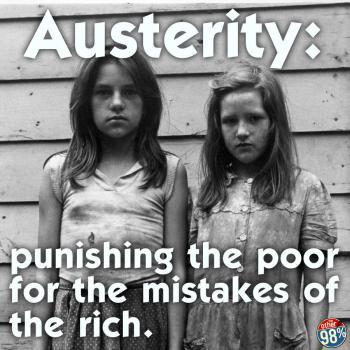If failing to understand some basic Keynesian relations is a part of the explanation of what happened, there was also another, and more subtle, story behind the confounded economics of austerity. There was an odd confusion in policy thinking between the real need for institutional reform in Europe and the imagined need for austerity – two quite different things … An analogy can help to make the point clearer: it is as if a person had asked for an antibiotic for his fever, and been given a mixed tablet with antibiotic and rat poison. You cannot have the antibiotic without also having the rat poison. We were in effect being told that if you want economic reform then you must also have, along with it, economic austerity, although there is absolutely no reason whatsoever why
Topics:
Lars Pålsson Syll considers the following as important: Economics
This could be interesting, too:
Lars Pålsson Syll writes Schuldenbremse bye bye
Lars Pålsson Syll writes What’s wrong with economics — a primer
Lars Pålsson Syll writes Krigskeynesianismens återkomst
Lars Pålsson Syll writes Finding Eigenvalues and Eigenvectors (student stuff)
If failing to understand some basic Keynesian relations is a part of the explanation of what happened, there was also another, and more subtle, story behind the confounded economics of austerity. There was an odd confusion in policy thinking between the real need for institutional reform in Europe and the imagined need for austerity – two quite different things …
An analogy can help to make the point clearer: it is as if a person had asked for an antibiotic for his fever, and been given a mixed tablet with antibiotic and rat poison. You cannot have the antibiotic without also having the rat poison. We were in effect being told that if you want economic reform then you must also have, along with it, economic austerity, although there is absolutely no reason whatsoever why the two must be put together as a chemical compound.
 We are not going to get out of the present economic doldrums as long as we continue to be obsessed with the insane idea that austerity is the universal medicine. When an economy is already hanging on the ropes, you can’t just cut government spendings. Cutting government expenditures reduces the aggregate demand. Lower aggregate demand means lower tax revenues. Lower tax revenues means increased deficits — and calls for even more austerity. And so on, and so on.
We are not going to get out of the present economic doldrums as long as we continue to be obsessed with the insane idea that austerity is the universal medicine. When an economy is already hanging on the ropes, you can’t just cut government spendings. Cutting government expenditures reduces the aggregate demand. Lower aggregate demand means lower tax revenues. Lower tax revenues means increased deficits — and calls for even more austerity. And so on, and so on.
